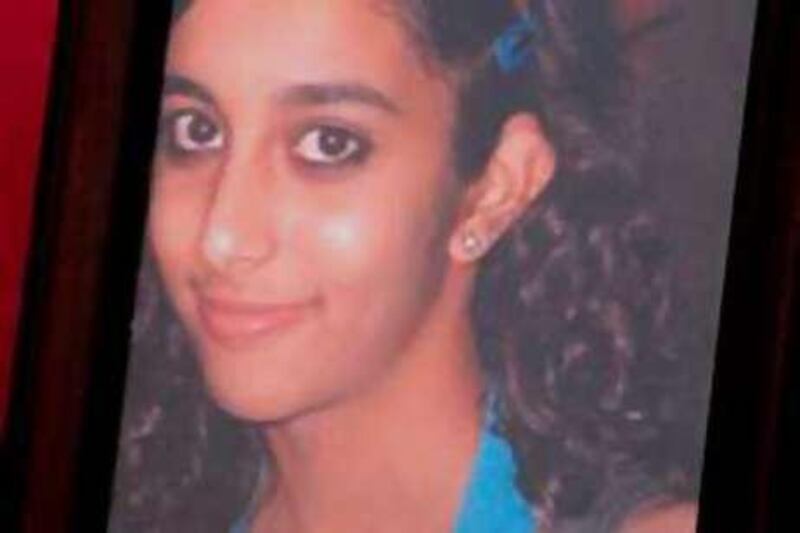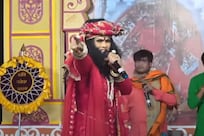NEW DELHI // When India's Central Bureau of Investigation announced it had solved the murder of Aarushi Talwar, the 14-year-old daughter of a successful dentist, it seemed the controversy surrounding the most sensational crime of the year was over.
Two months after Aarushi was found with her throat slit at the family home in Noida, a satellite town of New Delhi, the CBI named Krishna, an assistant at her father's clinic, along with two domestic servants from the neighbourhood, as the culprits. Ten days on, however, questions are now being raised not just about potential flaws in the initial investigation, but about the CBI's use of a "truth serum" - banned in most democracies- to extract confessions from the suspects.
While police say what they call "narco-analysis" is an invaluable and harmless tool, critics say Indian crime-busters are increasingly relying on it as a substitute for a proper forensic investigation. The renewed debate comes as India's supreme court is preparing to deliver its long awaited verdict on whether the use of narco-analysis and brain-mapping tests violate a suspect's constitutional rights.
"These methods are completely unscientific and non-legal," said Vijay Hiremath, assistant director of the India Centre for Human Rights and Law. "Forcing someone to say something against their will is torturous." Classified as a form of torture by the United Nations, narco-analysis is illegal in most western democracies, although US senate investigations in the 1970s showed that the Central Intelligence Agency had been carrying out chemical interrogation research programmes for decades.
Defectors from the Soviet Union also claimed the KGB had developed an odourless, tasteless and colourless truth drug called SP-17 that some of them say is still used by Russian security services. After the attacks of September 11, some senior US security officials publicly advocated administering narco-analysis drugs to suspected terrorists, although Donald Rumsfeld, then defence secretary, denied they were being used on terrorism detainees held at Guantanamo Bay in Cuba.
India adopted the practice for solving crimes in 2000, but it did not gain currency until 2002, when it was used to interrogate seven people accused of setting fire to a train carriage full of Hindu pilgrims, killing 58, in the western state of Gujarat. Since then, the number of suspects put forward for narco-analysis has grown exponentially, according to Dr Mohan, the director of the Forensic Sciences Laboratory in Bangalore, the first place in India to carry out the tests.
Today, about 300 people from around the country are waiting to undergo narco-analysis at his laboratory, including suspected thieves and fraudsters as well as murder and terrorist suspects. Most recently, Krishna and Raj Kumar, one of the two servants accused of killing Aarushi, underwent narco-analysis there. Typically, suspects are taken to an operating theatre where doctors inject them with sodium pentothal, commonly used as a general anaesthetic, to induce a "trance like state", according to Dr Mohan.
Questions based on "deceptions" uncovered during an earlier polygraph or lie detector test are put to the suspect by a forensic psychologist and the responses are videotaped. "During the conduct of narco-analysis, an individual is taken to a stage of disinhibition in which he is not able to consciously manifest a lie," Dr Mohan said. Typically a suspect will be questioned for about an hour, according to Rukmani Krishnamurthy, who heads the Mumbai forensics lab where the third suspect, Vijay Mandal, was interrogated under sedation.
Krishna, however, was drugged and reportedly interrogated for six hours, such was the media and political pressure on the police to crack the case. "There are the same risks as there are with administering a general anaesthetic - respiratory failure and heart failure," Dr Krishnamurthy said. Police say the technique is especially useful when they have failed to establish sufficient evidence in a criminal investigation.
"The narco-analysis is conducted when it is felt that the accused is not divulging the complete information to the police," said Rajan Bhagat, a New Delhi police spokesman. Information gleaned can be used to assist the investigation, but is inadmissible in court under a law dating back to colonial times stating that a confession in police custody is legally worthless. That is why many legal experts say the CBI's case against Aarushi's three suspected killers is hanging by a thread, given that investigators have yet to find the murder weapon.
Human rights and medical ethics advocates say narco-analysis is being used to make up for sloppy police work early on in the case, which has dominated headlines for much of the past two months. Noida police initially declared the prime suspect to be the Talwar's male housekeeper - until his body was found one day later in the family's locked veranda, his throat also cut. They then arrested Aarushi's father and held him for more than 50 days until the CBI took over the case from the Noida police and declared him innocent.
"This is an easy method that can be employed rather than carrying out a proper scientific investigation," said Mr Hiremath of the India Centre for Human Rights and Law. Because confessions under narco-analysis are not admissible in court, the police circulate videos to the media to show they have solved the case. And then if they are released, it appears to the public that the court has failed to deliver justice, Amar Jesani, the co-founder of the Medical Ethics Society, said.
"This practice is torturous," said Dr Jesani, who said videos showed the suspects being slapped to keep them awake. Dr Jesani, Mr Hiremath and other opponents of the practice say it violates the Indian constitution which prohibits any person being "compelled to be a witness against himself". More fundamentally, however, there are still widespread doubts that narco-analysis even works. "Tests have yet to be carried out to establish whether it really is impossible to maintain a lie under the influence of sodium pentothal," said Dr Krishnamurthy, whose clinic has done 20 narco-analysis tests.
"When you administer a general anaesthetic to a patient, it is for the betterment of that patient. Here, we are doing it to solve a crime," she said. "Non-invasive methods are better." @Email:hgardner@thenational.ae





